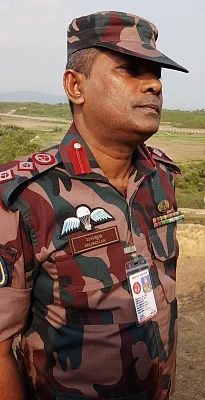By Rajnish Singh
Ghumdhum Border Post (Bangladesh), April 22 (IANS) When hundreds of thousands of Rohingya refugees, escaping a brutal military crackdown in Myanmar, gathered near the Bangladesh border last year, a senior Bangladesh army commander was caught in a dilemma. He was wary of illegal incursions but at the same time didn't want to leave innocent men, women and children to die.
Lt. Colonel Manjurul Hassan, of the Border Guards Bangladesh (BGB), was the first officer who was informed about some firing incidents across the border on the night of August 24-25, 2017. He didn't realise the seriousness of the matter and just ordered his forces to be alert.
Suddenly there was a barrage of calls, and firing incidents and bombings were reported from at least a dozen border posts. Hassan informed his seniors and left for the Ghumdhum Border Post where gunshots could be heard across the hills along the Naff river that divides the two countries, forming a 271-km boundary.
Then, on that dark night, he saw a flood of people running towards his side of the border. He ordered some of his troopers to take position with strict instructions not to open fire unless ordered to do so.
"I tried calling my counterparts on the otherside of the border (to know what is happening). But I couldn't establish contact," Hassan told IANS at the Ghumdhum border outpost, lying south of Naff, marking the border of southeastern Bangladesh and western Myanmar.
He said he saw people were crying, shouting and negotiating with his soldiers.
"I realised that they are innocents persecuted by their own people. The situation was different and I had to deal with it peacefully," Hassan said about "my first experience with this kind of humanitarian problem" that over the months snowballed into a major international refugee crisis.
They were Rohingyas of Rakhine state fleeing their homeland that doesn't recognise them as its citizens. They were speaking a language Hassan and his troops didn't understand. With some local help, he could decipher what they were trying to tell him.
"They said that (the Myanmar) army had cracked down on their villages, killing men, women, children -- people of every age. Their women were also reportedly raped. They were seeking shelter in Bangladesh, promising to return when situation became normal," Hassan recalled the broken conversations "etched in my memory".
He said it was a difficult decision to take. On the one hand, humans were escaping death and, on the other, his responsibility towards his country didn't permit him to allow in illegal entrants from a foreign nation.
The Rohingyas kept coming in droves. It was 11 p.m. and he asked his soldiers to collect all of them at the over six-kilometre stretch of no-man's land on the bank of the Naff river.
This prevented them from slipping into Bangladesh and also assured them that they were safe. The idea was to wait for orders from the government.
The next evening, as it rained heavily, gunshots were heard again. And then came the real challenge. This time the influx of Rohingyas was much greater than the previous night. They included new-born babies, critically-injured men, women, children and elderly people.
"A complete humanitarian crisis was unfolding in front of me. It was difficult for us to manage the crowd. BGB and locals were on their toes the whole night," Hassan said.
On August 26 morning, situation seemed better and many Rohingyas started returning to their country only to come back, many critically injured, hours later.
"On August 26-27 night, the government asked us to arrange food, water and medical facilities for the victims, but with the instruction not to allow them to enter as the exact situation was not known," he said.
The situation was even more frightening on August 28 when thousands of people carrying dead bodies started arriving from Down South through the Naff river.
"They had walked several days without food and water. Families were searching for their children, some kids lost their parents. Husbands were looking for their wives."
The government continued with humanitarian relief, including food and medicine. "Those critically injured were allowed treatment in local hospitals."
The same day, he said, "Our government decided to settle the ethnic minority at refugee camps in two border areas -- Kutupalong and Balukhali."
"So, this is the scenario. Till October, we received lakhs of Rohingyas. The Rohingya influx started decreasing day by day and now we have some 11 lakh refugees living here," said Hassan, who actually belongs to the Bangladesh Army and is currently on deputation heading the BGB's Cox's Bazar 34th Battalion.
(Rajnish Singh visited Bangladesh between April 15 and 18 as part of an Indian media delegation. He can be contacted at rajnish.s@ians.in)
--IANS
rak/sar/vm/tb
(This story was auto-published from a syndicated feed. No part of the story has been edited by The Quint.)
(At The Quint, we question everything. Play an active role in shaping our journalism by becoming a member today.)
